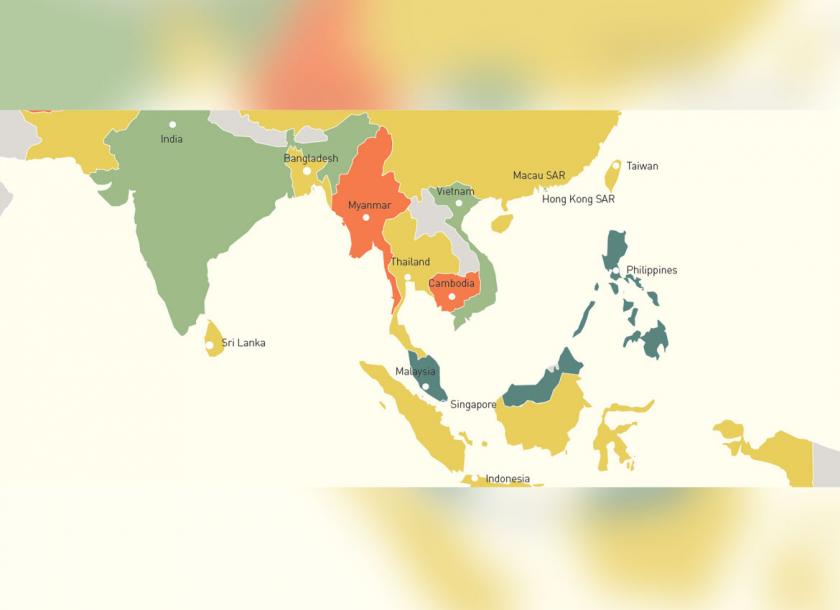Myanmar’s English proficiency ranked bottom 10% worldwide
Myanmar is ranked 82 out of 88 countries in English proficiency ranking for non-native speakers, according to a survey by the EF English Proficiency Index (EF EPI). It is the first time the country appeared on the annual index, which has been published for the eighth consecutive year.
Six ASEAN member states were ranked higher than Myanmar, with the exception of Cambodia. Laos and Brunei are not included in the survey, which also ranked neighbouring India, China and Bangladesh higher than Myanmar.
The report rates Myanmar as “very low proficiency”, along with Afghanistan, Cambodia and Uzbekistan. All four of them are in the bottom 10 percent of this year’s index internationally.
In ASEAN, Singapore jumped to the third place from the fifth last year, the Philippines moved to the 14th spot from 15th in 2017, while Malaysia dropped from 13th to 22nd.
One key finding highlights that deficiencies in English education reflect much larger systemic issues in many countries, such as the lack of investments.
“Just 2 percent of GDP is spent on education in Myanmar, and a third of teachers in Bangladesh are not certified to teach,” the publication noted. The mean years of schooling in Myanmar are 4.7 years.
In addition, informal and temporary employment is widespread in Myanmar and other parts of Asia, meaning that relatively few workers have access to ongoing, employer-subsidised education to improve their English skills.
Privatisation
In contrast, the report observed, Pakistan is reforming its schools at an extraordinary pace in the face of severe educational gaps, banking on privatisation to improve an underperforming system. Private providers have taken over 4,300 schools in Punjab and are expected to take over 10,000 in the region before the end of this year. Private money currently pays for more of Pakistan’s education system than the government does.
“It remains to be seen whether this privatisation push will improve educational outcomes, but there is evidence that in severely underperforming systems, expanding public-private partnerships is a faster solution than system-wide reform,” it said.
In fact, Myanmar has recently liberalised the education sector, allowing foreigners to completely own and operate schools teaching curriculums recommended by the Ministry of Education (MOE) or international educational programmes. The government expects interest from educational service providers in the UK, Singapore, Australia and New Zealand to scale up, bringing in FDI and expertise.
Already, Wall Street English has been expanding the number of centres in the country, while US educational programme provider Kaplan Inc has opened its Yangon campus. In addition, technical and vocational education and training (TVET) is prioritised by the education ministry’s National Education Strategic Plan 2016-21 and is key to modernising sectors which collectively account for 85 percent of Myanmar’s economic growth potential.
Commenting on the index, Pietro Borsano from Mandalay International University said private schools are “mushrooming across the country” and will help speed up the education reform. “But public-private partnerships are currently hard to achieve, as many private schools have to hire local licensed teachers to grant diplomas officially recognised by Myanmar’s education ministry. The system is now rather cumbersome,” he observed.
The academic added that the government should have a system to recognise the role of private schools and ensure their quality, without imposing a curriculum. Malaysia’s example is worth looking at because the country allows schools to teach in native Malay, English and Chinese languages. Many Myanmar-Chinese children have to attend two schools, a Chinese and a Myanmar one, every day, and he said this amounts to unreasonable burden on students.
The EF EPI is an international proficiency benchmark for non native English speakers gauged through online test scores from 1.3 million test takers in 2017. The report also found that Europe has by a wide margin the highest English proficiency in the world, while Latin America is the only continent to have experienced a decline in average adult English skills since 2017.
Source: https://www.mmtimes.com/news/myanmars-english-proficiency-ranked-bottom-10-worldwide.html


 English
English




